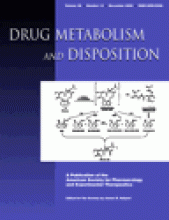Abstract
The objectives of this double-blind, placebo-controlled study were to assess the single dose tolerability, pharmacodynamics, and pharmacokinetics of Ro 41-3290 (5, 10, and 30 mg) and zolpidem (10 mg) in three sequential groups of 10 healthy male subjects. Pharmacodynamic (tracking, attention, and memory test) and pharmacokinetic measurements were conducted over a period of 24 and 50 h, respectively, after drug intake. Ro 41-3290 was well tolerated at all doses as was zolpidem. Performance in both a tracking and a memory search test was affected at 1.5 h after administration of zolpidem, whereas effects had vanished by 8 h. Ro 41-3290 induced moderate, dose-independent effects, which were most pronounced at 4 h after intake. Long-term memory, as assessed by a word learning and recall test, was not clearly affected by any drug. The pharmacokinetics of Ro 41-3290 were dose proportional with an elimination half-life of approximately 8 h. The relatively slow absorption of Ro 41-3290 (tmax approximately 2.5 h) and the concentration-effect time delay do not make it a good candidate to replace its parent compound Ro 41-3696 as an investigational hypnotic.
Footnotes
-
Send reprint requests to: Dr. Jasper Dingemanse, Jacor Research, Buchenstrasse 2, 4103 Bottmingen, Switzerland. E-mail:dingemanse{at}datacomm.ch
- Abbreviations used are::
- RMS
- root mean square error
- AUC
- area under the concentration-time curve
- Received May 25, 2000.
- Accepted September 11, 2000.
- The American Society for Pharmacology and Experimental Therapeutics
DMD articles become freely available 12 months after publication, and remain freely available for 5 years.Non-open access articles that fall outside this five year window are available only to institutional subscribers and current ASPET members, or through the article purchase feature at the bottom of the page.
|






